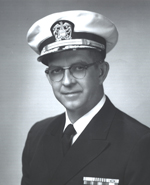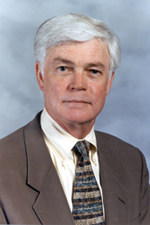 |
Carruth Wagner, M.D. |
 |
Jay Noren, M.D. |
The Wagner Foundation was created by and named for Carruth J. Wagner, M.D., a public health legend and a Nebraska native who passed away in 2002. The Wagner Foundation made the gift to the University of Nebraska Foundation to establish an endowed chair in public health at UNMC. The college will announce the Carruth J. Wagner, M.D. Foundation Endowed Chair at a luncheon today.
“The Wagner Chair gives the College of Public Health a tremendous opportunity to attract a leading scholar in public health,” said UNMC College of Public Health Dean Jay Noren, M.D. “The college’s goal is to recruit an individual who will contribute substantially to our efforts in developing enhanced and innovative public health interventions and programs consistent with the legacy of Dr. Wagner’s distinguished career in public health.”
The Wagner Chair is the first endowed faculty position in the College of Public Health, UNMC’s newest college and one of only 38 colleges of public health in the country. Income earned from the endowed fund will continuously support the work of renowned researchers and educators named to the position. The Wagner Chair is one of 82 endowed chairs and professorships at UNMC.
The College of Public Health hopes to recruit the person for the endowed chair in time for the start of the 2008-09 school year, Dr. Noren said.
Born in Omaha in 1916, Dr. Wagner earned his medical degree from UNMC in 1941. His career took him across the country, around the world and even to the White House.
Dr. Wagner served under four U.S. presidents — Dwight Eisenhower, John Kennedy, Lyndon Johnson and Richard Nixon. He held the positions of assistant surgeon general, director of the bureau of health services and chief of the division of health mobilization. In 1962, at the height of the Cuban Missile Crisis, Dr. Wagner was responsible for health mobilization in the event of nuclear, biological or chemical warfare.
Later that year, he became the second director of the Indian Health Service. During his tenure, Dr. Wagner was responsible for changes and improvements in the management, operation and delivery of a comprehensive health care system for American Indians and Alaska Natives. According to the Wagner Foundation, Dr. Wagner recognized that continued improvement in the health of the populations would result from the prevention of disease rather than treatment. The programs he initiated dramatically improved infant survival and the overall health of American Indian nations.
In 1965, Dr. Wagner was named director of the Bureau of Medical Services. There he was responsible for the Indian Health Service’s involvement with several Peace Corps training projects. Wagner also administered a number of international development projects, including Peace Corp Korea and an aid project for the John F. Kennedy Memorial Hospital in Monrovia, Liberia.
|
|
“Dr. Wagner was devoted to public service from the time he left medical school until his death,” said Alan Spilker, president and CEO, Carruth J. Wagner, M.D. Foundation. “Through his work he influenced countless number of people and improved the quality of life for many.”
Spilker said Dr. Wagner was a generous man who would have been pleased his support is helping advance public health training at his alma mater. The Wagner Foundation also made a gift in 2005 to create five scholarships for graduate students in public health at UNMC.
“Dr. Wagner recognized that by helping students in health care pursue their educational goals, he ultimately was contributing to the state of world health,” Spilker said. “His goal was to help them so they may help the public.”
Dr. Wagner funded as many as 19 annual scholarships for medical and nursing students. In 1979, he established a scholarship to benefit UNMC students and honor his mother’s memory. Mabel May Wagner worked tirelessly to finance her son’s education by caring for as many as 18 infants at a time in her home.
“Dr. Wagner was one of the greatest people I’ve met,” Spilker said, noting that Dr. Wagner was named as one of the top 100 Nebraskans in the 20th Century. “But if you cut through all the accolades, you realize he was an even better person.”